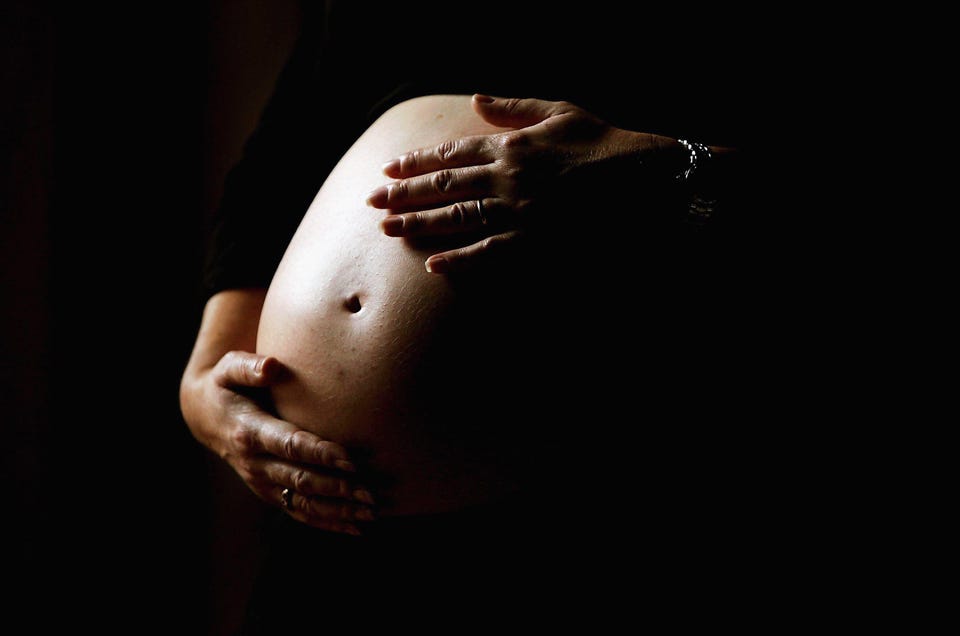Pregnant Women With Covid-19 Are Eight Times More Likely To Die Than Uninfected Counterparts


SYDNEY, NSW – JUNE 07: A pregnant woman holds her stomach June 7, 2006 in Sydney, Australia. … [+] Australia is currently enjoying a baby boom, with the Australian Bureau of Statistics registering a 2.4% increase in births from 2004 to 2005, which represents the highest number of births since 1992. The Australian Federal Government has been encouraging people to have more babies, with financial incentives and the slogan by treasurer Peter Costello to “have one for mum, one for dad, and one for the country”. The Federal Government has identified falling fertility rates and the ageing population as long-term problems for Australia’s growth and prosperity. (Photo by Ian Waldie/Getty Images)
Getty Images
A new BMJ Global Health study warns that getting infected with the SARS-CoV-2 virus at any night during pregnancy increases the mother’s risk of death by nearly eight times compared to those who remain uninfected. A group of researchers screened 137 studies and analyzed 12 studies conducted in Sweden Italy, Spain, the United States of America, Turkey, the Democratic Republic of Congo, South Africa, Uganda, Kenya, Nigeria, Ghana, Hong Kong, and China.
In this analysis, the researchers considered four categories of outcomes: hospital and critical care, maternal mortality and morbidity, adverse birth outcomes, and fetal and neonatal mortalities. A total of 13,136 participants in the 12 studies were recruited from February 2020 to July 2021. All of the participants underwent RT-PCR tests and 1942 had tested positive for Covid-19 during pregnancy.
The study found that pregnant women with a Covid-19 infection were four times more likely to be admitted to the intensive care unit (ICU) and 15 times more likely to be put on ventilator support. The highest risk for pregnant women who have Covid-19 is suffering from pneumonia as they are 23 times more likely to contract the disease. And at a five times higher risk of developing blood clots.
Infants of mothers with a Covid-19 infection were almost twice as likely to end up in the neonatal care unit. It was also three times more likely that babies would be born prematurely or 34 weeks earlier. Low birth weight was another risk factor (19% higher chances) for infants who were born to mothers with a SARS-CoV-2 infection.
“These findings underscore the need for global efforts to prevent Covid-19 during pregnancy through targeted administration of vaccines and non-pharmaceutical interventions,” the researchers concluded. “Further efforts are needed to advance our understanding of the best clinical care and management strategies for SARS-CoV-2-infected pregnant women and their newborns.”
The ‘Backsies’ Billionaire: Texan Builds Second Fortune From Wreckage Of Real Estate Empire He’d Sold
More stories like thisFewer stories like this
New Study Confirms A World-First International Migration Of Reef Manta Rays
More stories like thisFewer stories like this
Beauty Farm IPO Soars By 53% On Hopes China Spending Poised To Recover
More stories like thisFewer stories like this
Doctors say that pregnant women are at a far higher risk of developing complications due to a Covid-19 infection because their immune systems could undergo changes that might potentially make them far more vulnerable to respiratory viruses.
The Centers for Disease Control and Prevention states that certain factors can put pregnant women with a Covid-19 infection at a higher risk of experiencing complications during or after pregnancy. That includes underlying medical conditions like chronic kidney disease, chronic liver disease, cancer, asthma, chronic obstructive pulmonary disease (COPD), bronchitis, and hypertension.
Women belonging to racial and ethnic minority groups might also be at a higher risk of falling very sick from Covid-19 during or after pregnancy, according to the CDC. This is mainly because of the health inequities they face and a lack of access to adequate healthcare facilities or treatments.
One way to reduce the risk of exposure to the SARS-CoV-2 virus during pregnancy is to opt for telemedicine consultations with your gynecologist and primary doctor to avoid frequent visits to clinics and hospitals that tend to be high-risk zones. Other than wearing well-fitted N95 masks, it is best to avoid poorly ventilated indoor spaces and crowds.
